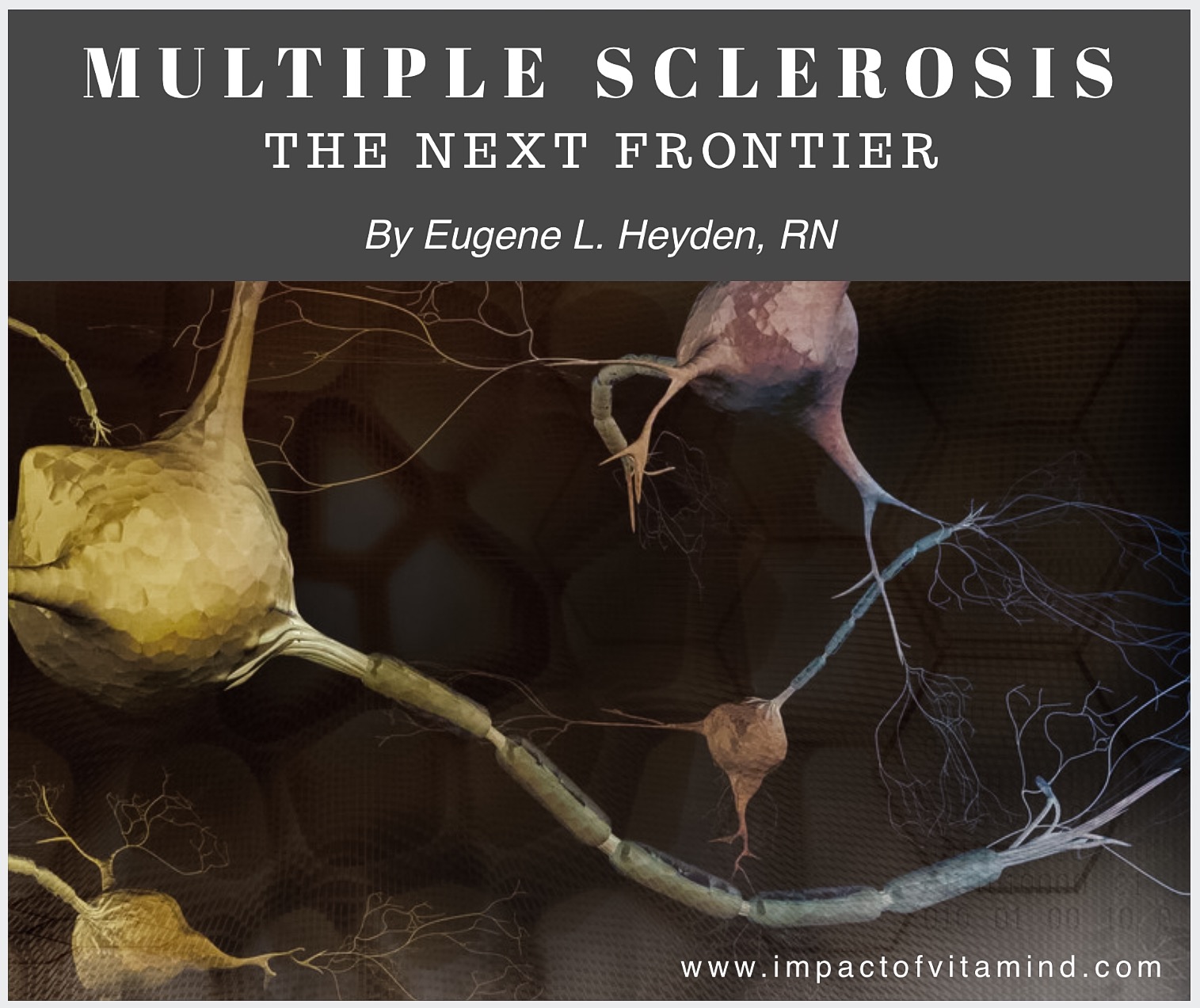Multiple Sclerosis: The Next Frontier

Last update: 03-13-23
By Eugene L. Heyden, RN
It’s just a matter of time. Things will click. The future will arrive. I hope we don’t have to wait long. Something unexpected has occurred.
“A growing body of evidence in animal models of MS implicates the gut microbiota [bacteria and the like] in the induction of central nervous system (CNS) autoimmunity.” (Berer and Krishnamoorthy, 2012)
There is growing suspicion that gut bacteria play a pivotal role in initiating and perpetuating the neuroinflammatory disease known as multiple sclerosis (MS). In a laboratory model of MS, known as experimental autoimmune encephalomyelitis (EAE), the administration of non-absorbing antibiotics “beginning 1 week prior to sensitization, altered the composition of gut flora and, intriguingly, also ameliorated the development of EAE.” (Yokote et al., 2008)
That bacteria within the gut could influence a disease process occurring in the brain and spinal cord is, indeed, quite surprising. In the not-too-distant past, to even consider this would have been crazy. But not anymore. We have learned so much! Suspicions are giving way to conclusions.
“Certain populations of commensal [normally found] bacteria are capable of attenuating CNS inflammation. The gut microbiota has the capacity to affect the development of autoimmune central nervous system (CNS) disorders.” (Kamada et al., 2013, emphasis added)
“Combined, these data indicate that early dysregulation in MS involves an increase in pro-inflammatory and a decrease in anti-inflammatory gut microbiota milieu.” (Tremlett at al., 2016, emphasis added)
To further characterize the role gut bacteria plays in initiating and in sustaining CNS autoimmunity, some very fascinating studies have been performed.
In one study, investigating the role bacteria play in MS, Lavasani and team were able to reverse experimental MS in mice simply by manipulating their gut flora, using a mix of probiotic bacterial strains to accomplish this end. “We showed that therapeutic treatment with this new probiotic mixture successfully reversed established EAE.” (Lavasani et al., 2010) Success in this study was attributed to an expansion of Treg populations and intensifying their anti-inflammatory actions. So, what is a Treg? And why is it important?
A Treg is a migratory immune cell that travels to an area undergoing inflammation. Given the opportunity, Tregs show up in great numbers. Their job is to calm things down and promote healing at a time when inflammation is no longer necessary and no longer beneficial. Additionally, a Treg cell can prevent unnecessary inflammation from emerging, taking hold or getting out of hand. Important to our conversation, Tregs play a key role in preventing and resolving autoimmunity. Autoimmunity, widely believed to be the cause of MS, is an attack on components of self by an individual’s own immune system. And in MS, the myelin sheath that covers nerves and aids in impulse transmission is under attack. Damage ensues. Loss of function follows. If I had MS, I would want every Treg I could get my hands on and I would immediately put them to work on my behalf. This immune cell can apparently reverse autoimmunity. It can promote healing. It can stimulate remyelination. It can be your best friend.
In another study . . .
“Our previous and present studies suggest that differing compositions of gut microbiota could regulate the balance between protection and disease induction in MS and may offer a novel therapeutic approach for disease intervention.” (Ochoa-Repáraz et al., 2010, emphasis added)
In the study quoted above, the investigators found that no particular gut pathogen is required to induce experimental MS or to protect against its development. Apparently, all that is needed is a disruption in the balance between various microbial species in the gut, a state called dysbiosis, and the disease appears from out of nowhere in mice genetically predisposed to demyelinating disease. Along these lines, another study, Chen et al., 2016, reports that patients with relapsing-remitting MS have a distinct (and abnormal) gut microbiota profile, and state: “Thus our study is in agreement with earlier reports that MS patients had dysbiosis of fecal microbiota in the gut.” (Chen et al., 2016)
These two studies and many others strongly suggest that dysbiosis is behind the pathogenesis of MS. The authors of one study—identifying dysbiosis present in pediatric MS patients—have reached the following conclusion: “Combined, these data indicate that early dysregulation in MS involves an increase in pro-inflammatory and a decrease of anti-inflammatory gut microbiota milieu.” (Tremlett et al., 2016) But that is not to say that a particular pathogen is not involved. There is now compelling evidence for a bacterial trigger.
Rumah et al., 2013, reports the discovery of a bacterium, never before identified in a human subject, present in a woman with active MS. This bacterium is a variant of a common soil bacterium called Clostridium perfringens, and emits a toxin that can leave the gut, travel to the brain, cross the blood brain barrier, and bind with myelin. It’s up to no good. The toxin is known to create demyelinating disease in grazing animals who never see it coming. Subsequent to the discovery of this unique bacterium present in a MS patient, this team of investigators tested preserved blood and cerebral spinal fluid samples of patients with MS. Surprisingly, they found prior exposure to this bacterium was 10 times more prevalent in the samples from MS patients than in the samples of healthy controls. Very intriguing! Perhaps monumental!
As we learn more about the relationship between MS and the gut, possibilities are emerging. Could therapy directed at the gut, targeting the microbes within it, be the next frontier in the treatment of MS? Some seem to think so.
“Although epidemiological studies in man connecting the gut commensal [normally found] bacteria with CNS demyelinating disease have not been reported, perhaps due to the complexity of human microbiome, repopulating the gut microbiota . . . may be a reasonable pathway by which to control disease pathogenesis.” (Ochoa-Repáraz et al., 2011, emphasis added)
“It is possible that treatment strategies of MS in the future may include therapeutic intervention designed to affect the microbiome such as probiotics, faecal transplantation and delivery of constituents of organisms isolated from the microbiome, although more work is required.” (Jangi et al., 2016, emphasis added)
And then we have the unexpected
Let me assure you, what I am about to share occurred quite unexpectedly, and at a time when little was known about the role gut bacteria play in MS. Read the following very carefully:
“In 2001, Borody et al. reported three wheelchair-bound patients with MS treated with FMT [faecal microbiota transplantation] for constipation. Bowel symptoms resolved following FMT; however, in all cases, there was also a progressive and dramatic improvement in neurological symptoms, with all three patients regaining the ability to walk unassisted. Two of the patients with prior indwelling urinary catheters experienced restoration of urinary function. In one patient of the three, follow-up MRI 15 years after FMT showed a halting of disease progression and ‘no evidence of active disease.'” (Borody et al., 2014, emphasis added)
There is, perhaps, no better way to both favorably and dramatically alter the gut microbiota than by the strategy known as fecal microbiota transplantation (FMT). An attempt may be made to delete a problematic bacterial species with antibiotics; however, bacterial diversity takes a hit, as many good bacteria die in the process. Unintended consequences may arise. One may also put forth the effort to increase bacterial diversity with probiotics, creating unfavorable conditions for pathogenic bacteria to thrive and exert their influence—all in an attempt to modify both local and distant immune responses. But we don’t have all day. We need to do something decisive, something capable of creating a dramatic and immediate change.
FMT does not fool around. It is the gift of a complete, new set of bacteria in an instant. A donor who is disease-free is chosen, things happen, the procedure is performed, and voilà, a diseased person is transformed.
FMT is nothing new. Its use dates back some 2,000 years. Today, it has become somewhat mainstream. In the hospital where I work, we perform FMT quite regularly. We do it to reduce morbidity and mortality in the battle against C-diff.
C-diff, is a gut infection that kills between 14,000 and 20,000 Americans each year. However, expect that number to go down dramatically, as FMT is greater than 90% effective in curing this disease and is becoming more popular and more accessible. And, it handles this infection both promptly and dramatically. It is a gift. For some, the gift of life. As for MS, there may be nowhere else to turn.
For the three individuals mentioned above, FMT was the gift of a new life. What seemed to be required for them in their individual battle against MS was an instantaneous, dramatic change in the composition of their gut flora, then the healing could begin. Are you listening? Listening carefully? Perhaps in MS, the therapies we currently use are no match for this “force”—the immense influence exerted by a disruptive, abnormal composition of gut bacteria, an influence that can extend to the brain and the spinal cord. I believe the next frontier in the battle against MS will be to target this force (and not fool around). In my humble opinion, there is simply no better way to do this than with FMT. Next, let’s take a quick look at what this FMT business is all about.
In brief, FMT involves careful donor selection and testing to rule out the presence of transmissible diseases in the donor. Next comes stool collection and processing. Also needed, of course, is a recipient who is willing to do just about anything to get well. Somewhere along the line, and at the appropriate time, a blender is plugged in and asked to do something most unusual.
In preparation for FMT, the recipient typically undergoes a bowel prep the day prior to transplantation and may have recently completed a course of antibiotics. Antibiotic therapy is utilized in this situation to kill off the bacteria present within the gut to favor the dominance of good bacteria, once the gut is recolonized. In essence, FMT is a treatment modality that ensures that an improper mixture of gut bacteria is promptly replaced by a bacterial community that is regarded as normal and will not contribute to a disease process.
“The main advantage of FMT over other forms of microbial manipulation, for example antibiotics, prebiotics and probiotics, is that FMT provides the full spectrum of microbial organisms from a healthy individual and therefore can treat as yet uncharacterized dysbiotic conditions, while bypassing the need to decipher the complex composition and functional intricacies of the dysbiosis.” (Borody et al., 2014)
As reported, the three individuals with long-standing MS experienced a dramatic response to FMT, “with all three patients regaining the ability to walk.” Most notably, in one patient an MRI at 15 years post-FMT “showed a halting of disease progression and ‘no evidence of active disease.’” (Borody et al., 2014) Clearly, what happened in the gut did not stay in the gut. And clearly something unexpected and profound took place . . . and MS vanished (or substantially improved).
Let me leave you with this:
In summary, we have found alterations of the human gut microbiome in MS that correlate with changes in the immune transcriptome and treatment. It is possible that treatment strategies of MS in the future may include therapeutic interventions designed to affect the microbiome such as probiotics, faecal transplantation and delivery of constituents of organisms isolated from the microbiome, although more work is required. In addition, characterization of the gut microbiome in MS may provide biomarkers for assessing disease activity and could theoretically be an avenue to prevent MS in young at-risk populations. (Jangi et al., 2016, emphasis added)
Related Post (Click on image to open)
Dedication
In loving memory of Jonna Dybdahl-Buell
References
Berer K, Krishnamoorthy G. 2012 Commensal Gut Flora and Brain Autoimmunity: A Love or Hate Affair? Acta Neuropathologic, May 1; 123(5):639–51
Borody TJ, Brandt LJ, Paramsothy S 2014 Therapeutic Faecal Microbiota Transplantation: Current Status and Future Developments. Curr Opin Gastroenterol, Jan 1; 30(1):97–105
Chen J, Chia N, Kalari KR, Yao JZ, Novotna M, Soldan MM, Luckey DH, et al 2016 Multiple Sclerosis Patients Have a Distinct Gut Microbiota Compared to Healthy Controls. Scientific Reports, 6:28484
Jangi S, Gandhi R, Cox LM, Li N, Von Glehn F, Yan R, Patel B, et al 2016 Alterations of the Human Gut Microbiome in Multiple Sclerosis. Nature Communications, Jun 28; 7
Kamada et al 2013 Role of the Gut Microbiota in Immunity and Inflammatory Disease. Nature Reviews Immunology, May; 13:321–335
Lavasani S, Dzhambazov B, Nouri M, Fåk F, Buske S, Molin G, Thorlacius H, et al 2010 A Novel Probiotic Mix Exerts a Therapeutic Effect on Experimental Autoimmune Encephalomyelitis Mediated by IL-10 Producing Regulatory T Cells. PLoS ONE, Feb; 5(2):e9009
Ochoa-Repáraz J, Mielcarz DW, Ditrio LE, Burroughs AR, Begum-Haque S, Dasgupta S, Kasper DL, Kasper LH 2010 Central Nervous System Demyelination Disease Protection by the Human Commensal Bacteroides fragilis Depends on Polysaccharide A Expression. The Journal of Immunology, 185:4101–4108
Ochoa‐Repáraz J, Mielcarz DW, Begum‐Haque S, Kasper LH 2011 Gut, Bugs, and Brain: Role of Commensal Bacteria in the Control of Central Nervous System Disease. Annals of Neurology, Feb 1; 69(2):240–247
Rumah KR, Linden J, Fischetti VA, Vartanian T 2013 Isolation of Clostridium perfringens Type B in an Individual at First Clinical Presentation of Multiple Sclerosis Provides Clues for Environmental Triggers of the Disease. PloS one, Oct 16; 8(10):e76359
Tremlett H, Fadrosh DW, Faruqi AA, Zhu F, Hart J, Roalstad S, Graves J, Lynch S, Waubant E 2016 Gut Microbiota in Early Pediatric Multiple Sclerosis: A Case-Control Study. European Journal of Neurology, Aug 1; 23(8):1308–21.
Yokote et al 2008 NKT Cell-Dependent Amelioration of a Mouse Model of Multiple Sclerosis. Am J Pathol, 173:1714–1723
Disclaimer: This article is presented solely for informational purposes. The information contained herein should be evaluated for accuracy and validity in the context of opposing data, new information, and the views and recommendations of a qualified health care professional, and not to be substituted for professional judgment and guidance or to provide reason to neglect or delay appropriate medical care. It is the reader and reader only who bears the responsibility for any actions that could be construed as being a response to the information contained herein. The statements and opinions expressed by the author have not been reviewed or approved by the FDA or by any other authoritative body, nor is the author endorsing any product or specific therapy. This article is offered to the reader to broaden his or her understanding of the issues discussed and to help identify options that may be suitable for the individual to pursue, on behalf of self or others, under approval and direction of a qualified physician. The author and publisher offer no guarantees of the accuracy or validity of the quotations incorporated into this article or the accuracy or validity of the information presented by the resources that are herein recommended.
Copyright © 2017–2022 Eugene L. Heyden, RN
All Rights Reserved




